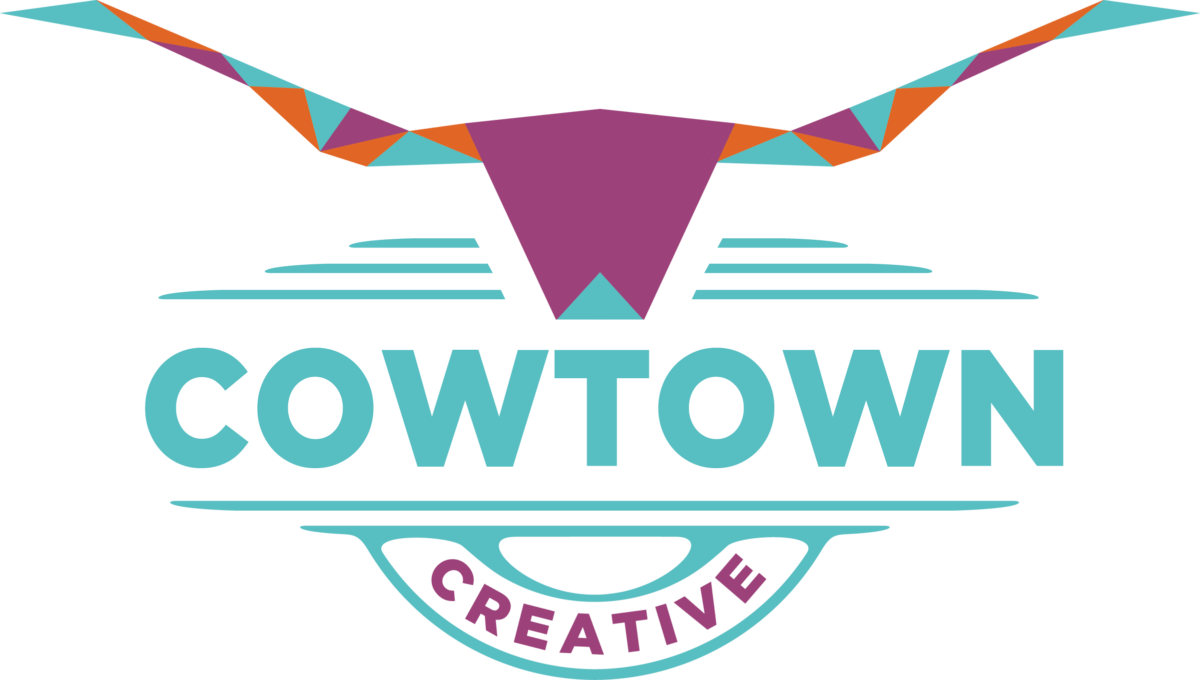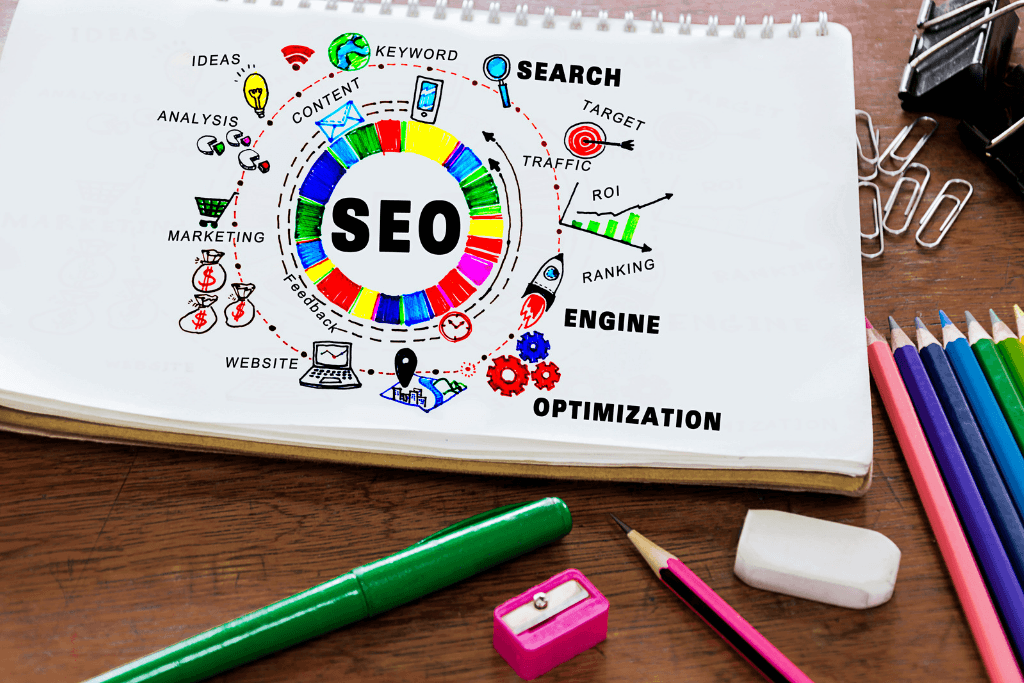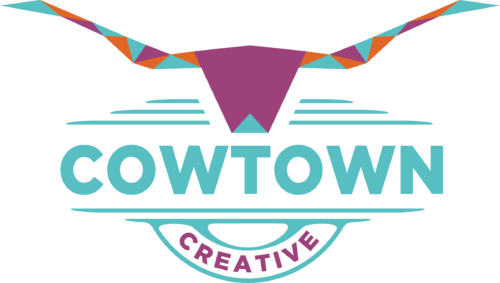An SEO agency proposal is usually full of jargon. Understand what it really means, and recognize when it’s smoke and mirrors.
[ez-toc]
Any SEO agency worth hiring will tell you, in plain language:
- What they recommend to improve your website’s visibility in search;
- Why it’s important; and,
- How they expect changes to improve rankings.
The biggest red flags we see include proposals that use a lot of industry jargon to make SEO work seem like hocus pocus, plus big promises about results they’ll achieve in unrealistic time frames. So, let’s break down what SEO really is so you can see through the fairy dust and empty promises some SEO agencies like to dish out.
What is SEO?
SEO is an acronym for search engine optimization. It’s a combination of technical and content-based improvements to a website that are focused on helping it appear on a search engine results page (SERP) when someone uses a search engine like Google to find information.
Why is SEO important?
Optimizing your website for SEO ensures that search engine robots can:
- see your site,
- quickly discover what it’s about, and
- assign it a SERP rank on page one.
That’s the ideal scenario. Why do you want to be on page one? SEO pros at Backlinko keep up with a treasure trove of relevant SEO industry statistics, but the most important one for understanding why you need an SEO agency-level strategy is this one:
Websites that show up on page 1 in search get nearly 70% of all the clicks
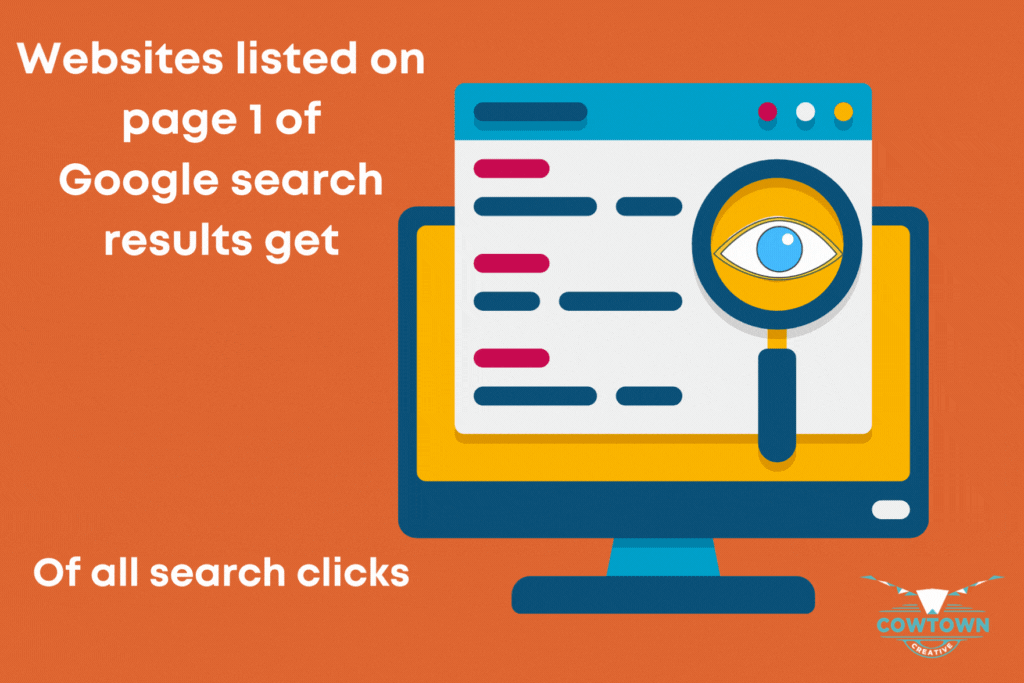
You can do everything right with your organic and paid digital marketing efforts and still not see the website traffic you want. If Google search robots can’t crawl all over your website pages and easily find the more than 200 factors the search engine algorithm uses to assign page rank, your site won’t end up on page one.
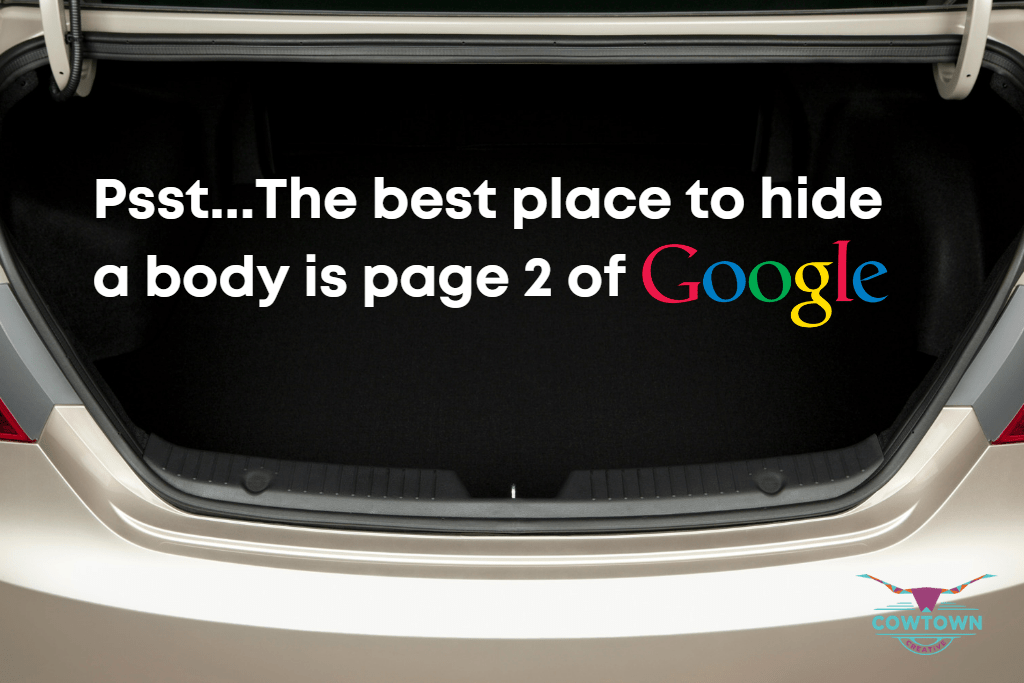
Now that you know why SEO is important, let’s break down all the SEO agency technical mumbo-jumbo so you know more about how it works.
What are the 3 pillars of SEO?
The three pillars of SEO are a high-level standard of how search engines rank websites:
- Authority
- Relevance
- User Experience (UX)
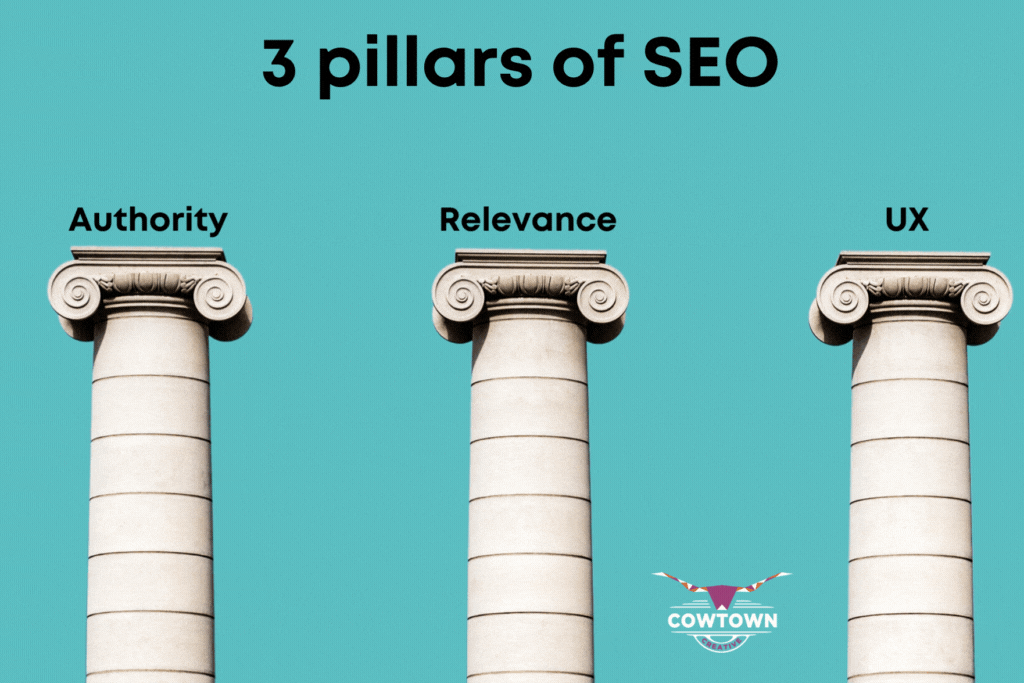
Search engine bots use all those 200+ factors we mentioned above to determine your site’s credibility, the quality of information it offers relating to the search term, and how easy it is for a user to find that information when they land on the page in question. These three pillars are basically categories those factors fall into. They impact domain authority (DA), which directly correlates to rank in search results.
Want to learn more about the 3 pillars of SEO? Searchenginejournal.com offers this beginner’s guide to SEO if you’d like to nerd out more about all the fun facets of optimization. No sarcasm, we’re nerdy about it, too.
What are the 4 types of SEO?
SEO can be broken down into four primary categories:
- Local SEO (local listings management, on- and off-page SEO focused on local search, PR, social)
- On-page SEO (content, links, and the page structure in your website)
- Off-page SEO (backlinks, search listings like Google Business Profile, social media)
- Technical SEO (all the techy things that make your site easy to use and secure)
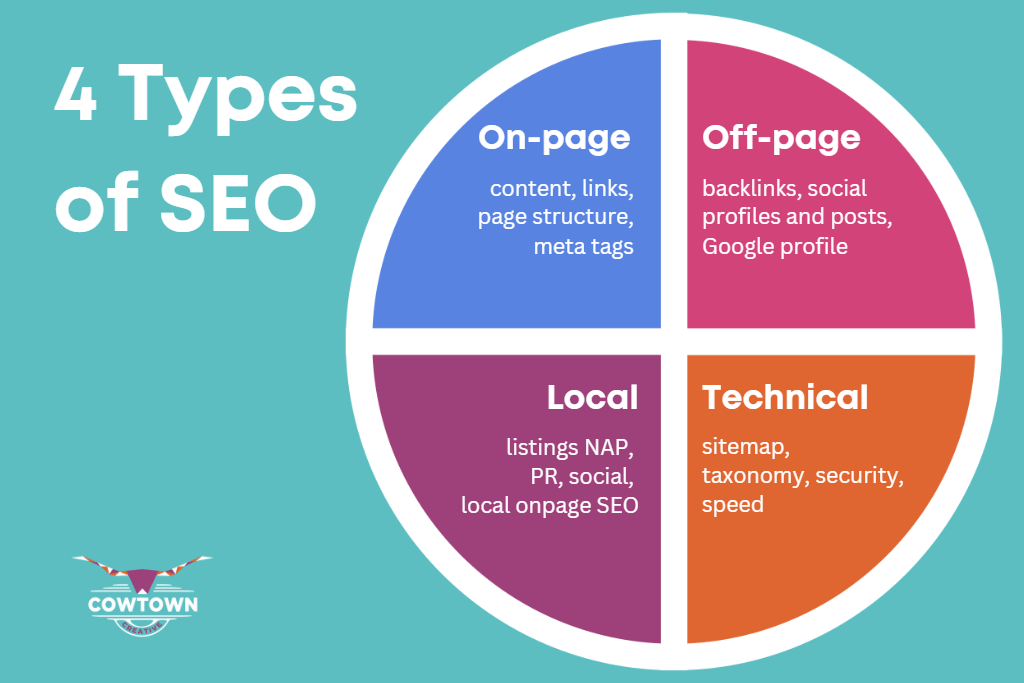
You’ll notice that local SEO repeats some of the same elements you see in the other three categories. That’s because local search is just a bit different than national search and requires more context.
To tell the search engine bots that your page is relevant to someone searching using “near me,” for example, you have to figure out where your target audience will be searching the web and optimize for that location.
Many SEO agency proposals make local optimization look like some sort of witchcraft. It’s actually a search engine bot focus that sometimes stands alone and requires dedicated SEO efforts for great local SERP rankings.
We promise this will make sense in a few seconds. Don’t quit yet!
SEO agency tricks for local search
OK, there aren’t really tricks for local search—only the proven tactics we’ve found effective at increasing local traffic. Our B2C clients (especially those who provide services) are most likely looking for people who live locally who need their services, so that’s our focus much of the time when addressing all 4 types of SEO.
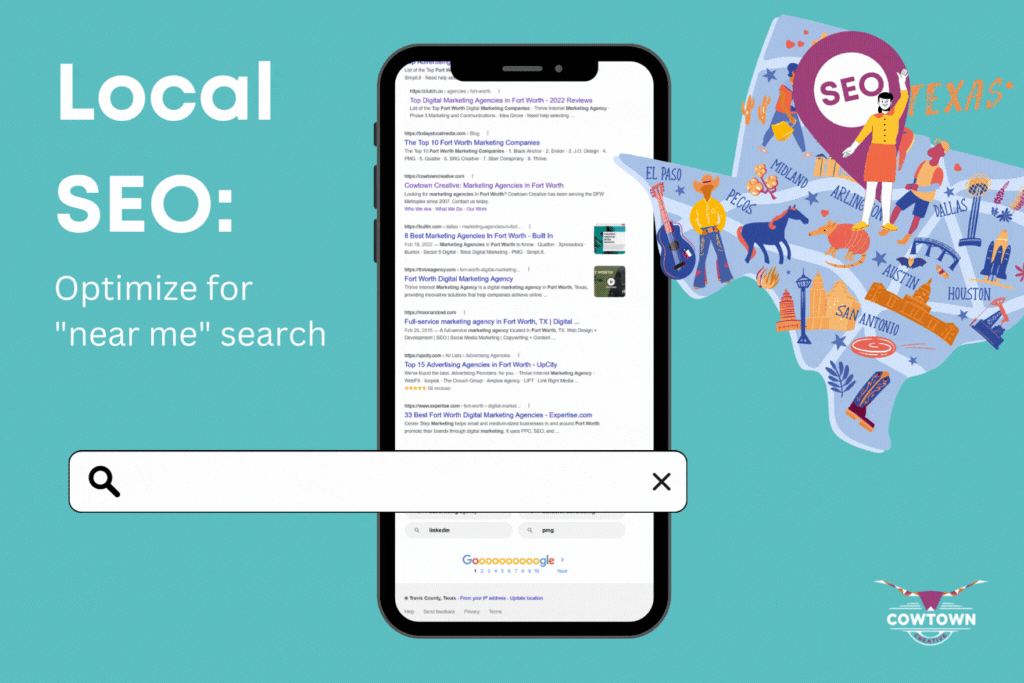
For local B2C service companies and small businesses, we don’t really care about out-ranking national companies that are at the top of the search results for a seed keyword. We’ll take that seed keyword and instead add a local search qualifier like “near me.”
Here’s a great example. The article you’re currently reading is optimized for the key phrase “SEO agency near me.” If you search “SEO agency,” Google will automatically generate some local results on the top of the page and in the map, based on your location. Those results are delivered based on current ads running for “SEO agency” AND local companies that have optimized their Google Map Pack listing for that search term.
By optimizing this post with references to Fort Worth and links to reputable companies or agencies in the Metroplex, we don’t have to use the clunky “near me” qualifier that you see stuffed into so many blog posts that are frustrating to read. Local references and links tell the search engine bots that this page is relevant to people in the DFW area who are using the search term “SEO agency near me.”
And so, because:
- our local Google Business Profile listing is updated;
- all our company listings show the same business name, local Fort Worth address and phone number (NAP); and,
- our social media posts include local links and references,
Cowtown Creative’s “Ultimate SEO Agency Guide to Search Engine Optimization” should show up in an “SEO agency near me” search, even without using “near me” in our keywords.
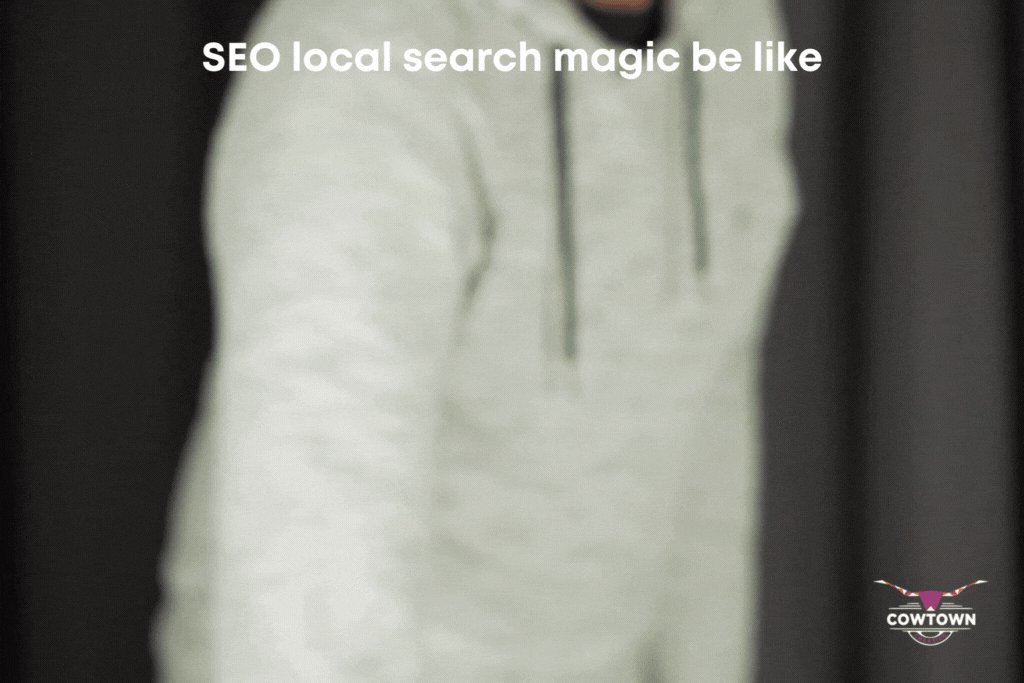
Local search isn’t technically magic, but you can totally call us magicians if you want. We’ll take it!
A quick on-page SEO checklist
On-page SEO includes both what a user sees on your page (content and images), and things like meta tags and alt tags in the back end of your website.
Here’s a quick list of all the things you need to check on every page of your website to optimize for UX and robot accessibility:
- Assign a focus keyword based on search volume and page content
- Use that keyword in your page slug, SEO title, and H1 header
- Use that keyword in the first paragraph of your content and one (H2 or H3) subhead
- Your content should have a keyword saturation of 10 percent (400 words = 4 keywords)
- Provide at least 350 words of useful, awesome content that’s easy to read
- Make that content scannable: break up long paragraphs, use lists, use graphics, use white space
- Link out to a great resource for more information
- Link to at least one other page in your website
- Add image alt text and a page meta description that use your focus keyword
- Make sure the page is fun, looks great, loads quickly, and provides a great user experience
Easy enough, right?

The truth about SEO work is that it can be tedious and time-consuming. The payoff is worth it, so put a little more effort into creating and updating on-page content that ROCKS at least once or twice a month. You’ll see results within 9-12 months as your content is shared and you get backlinks, which are part of a great off-page strategy any good SEO agency would implement.
Oh, good question. Let’s go there.
What are backlinks for off-page SEO?
Backlinks are links to your website page from another website. If you get backlinks from an established website that has decent traffic and is related to your industry, products, or services, those links are considered credible and are going to help boost your site’s performance in search. (Check out this article if you want to know more about toxic backlinks.)
Authoritative backlinks are the holy grail of SEO, because they’re hard to get.
How important are backlinks for domain authority?
This is a hotly debated topic in recent days, but the short answer is that backlinks are still important and probably always will be. John Mueller, the Senior Webmaster Trends Analyst at Google, made a statement in early November 2022 that hinted at a search algorithm shift that leans less heavily on backlinks for assigning page authority.
The thing is, the algorithm won’t ever NOT consider backlinks when crawling pages for authority, relevance, and UX. Backlinks are currently in the top 3 (of 200+) factors for assigning search page ranking.
Backlinks speak directly to all three pillars of SEO:
Backlinks tell readers (and bots), “You’ll find some great info at this site, because we know it’s relevant and we trust this company/person to provide useful information.”
Backlinks are like a vote for your site. If a highly ranked (top 5) website links to your site so their readers can learn more detailed information about a search topic, it’s like a vote of trust. Every backlink is a total score, and you should try to get one or two great ones a month.

Should I buy backlinks?
This is a complicated issue, and the answer is, “it depends.” Any SEO agency that promises you 80 backlinks a month from high-DA sites is probably blowing smoke. You may end up with backlinks from questionable sites (see toxic above) or random forums and comments sections that could actually hurt your page rankings.
Besides, you want to create connections to other companies people trust. You want to grow your site traffic and your social followers, right? Real backlinks added by a site owner because they trust and appreciate what’s on your page are impactful in many ways in the digital world. Plus, (BONUS) they’ll help your page rankings.
Get above-board paid backlinks if you’re going to do it, not mass-farmed backlinks generated by some 18-year-old Fiverr keyboard warrior. Let them fund their Taco Bell budget at the expense of some other website’s domain authority.
Here’s a more expansive article about paying for backlinks via sponsored guest blog posts, press releases, and similar techniques that may or may not carry a risk of being blacklisted. Proceed at your own risk.
Technical SEO, simplified
We’ve talked so far about what search engine bots look for on your page and off, and how the algorithms prioritize and assign page rank in search results. Technical SEO deals specifically with the structure of your website as it relates to bot access and the user experience.
An SEO agency will address technical elements that include:
- Security (valid SSL certificate + https://)
- Site speed (loads quickly and completely)
- Canonical URLs (no duplicate pages that confuse the bots)
- Indexation (can the bots find, and are they allowed to crawl, your page?)
- UX (user experience: how easy is it for the user to access and navigate your site?)
- Accessibility (is your site easy to use for people with disabilities?)
- Schema (the language that tells bots what kind of content you’ve provided)
- Lazy loading (loading page elements as the user scrolls, instead of all at once, to improve initial site load speed)
All these elements, when they’re set up correctly, improve site access and usability for people and bots. A site that’s easy to use is also easy to rank, and we want to make it easy for bots to inspect all your elements and find them in tip-top shape. That’s how all the on-page, off-page, and local work ends up paying off with page one search results. It all rests on technical SEO clean-up.
Want to learn more about all the technical SEO things that you can do to support your ranking efforts? Backlinko offers a deeper dive into technical SEO that goes into way more detail than our simplified version. Go ahead, get techy with it. We’ll still be here when you come back for simplicity, all dazed and confused.

Bringing it all together: Building your SEO strategy
The way an SEO agency creates a strategy for your website optimization is going to look different from the way you might do it yourself, but every SEO strategy should be built on recent website data and the latest search algorithm. You can start just like we would, by mining all your website’s data sources for actionable SEO improvements with the highest ROI for your time investment.
Step by step, here’s how to start creating your SEO strategy for better SERP ranking:
- Use some of our favorite free data extraction and reporting tools and tips to get a high-level view of what’s happening with your site, and how it compares to your competitors.
- Create a list of the easiest fixes first. Most of those will be on-page content and image improvements (use that checklist!), then off-page elements like updating NAP on your listings and setting up social profiles correctly.
- Create some great content based on high-search-volume keywords, user experience, and what you think reputable companies in your industry might want to link to.
- Watch your search traffic, user behavior, lead generation, bounce rate, and rankings using data from Google Analytics, Semrush, Moz, Ahrefs, and lots of other data sources (there are tons, and many offer free versions that still give you awesome insights).
- Lather, rinse, repeat.
That last step is probably the most important. SEO is not a “set it and forget it” proposition. Algorithms and user behavior change constantly, and there’s always a way to improve SEO strategy and keep building your site’s UX and DA for higher SERPs.
See that jargon? You understand that now, you pro. No SEO agency is going to be able to dazzle you with the alphabet soup and complex terms they like to throw out.

Real talk about SEO results
You won’t get much in the way of results in 30 or even 90 days with SEO. We won’t promise you page 1 ranking. What we will promise you is improvement, and we’ll deliver customized monthly reports that show that improvement over time. We’ll do what works with your overall digital strategy, what makes sense, and what the data tells us is most effective. We’ll monitor search algorithm changes and user behavior to make adjustments, then lather, rinse, repeat.
Knowledge is power, and at Cowtown Creative, it’s our job to make sure our clients understand what we do, why we do it, and why it’s important within the context of their company goals and integrated marketing strategy. SEO is just one piece of a huge and complex puzzle with a single focus: real, measurable results. Go get some.
Hire a marketing agency you can trust, even if it isn’t ours. Or, go ahead and set up a consultation to learn more about how we’re more than an SEO agency – Cowtown Creative does it all.
